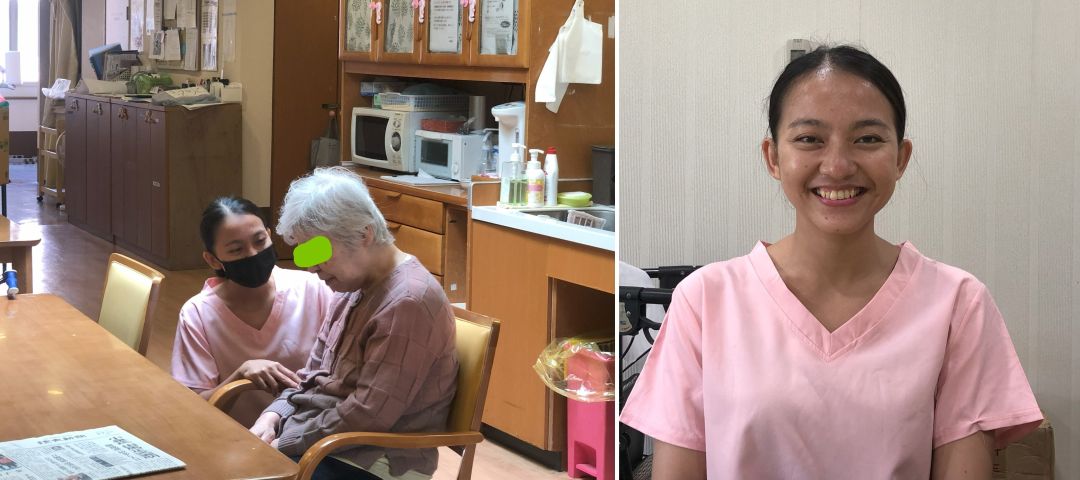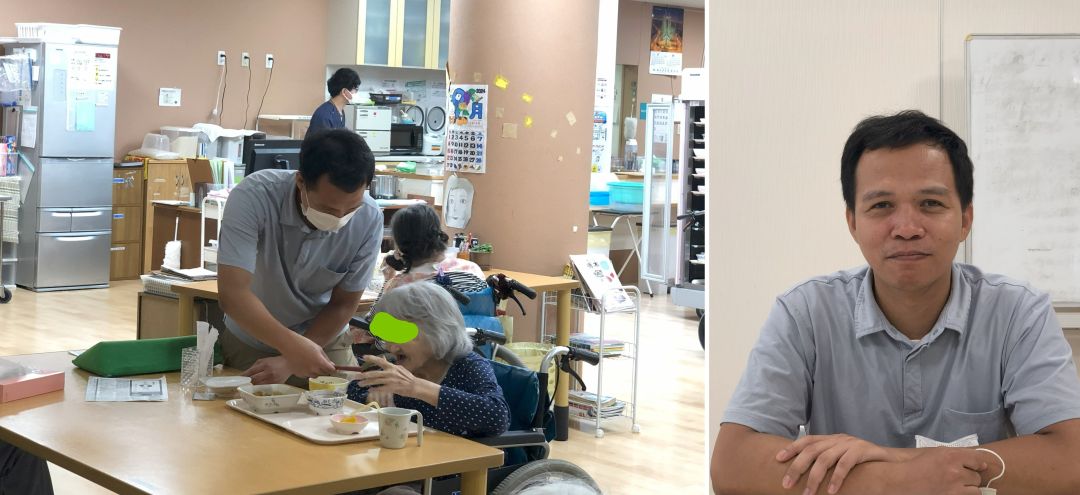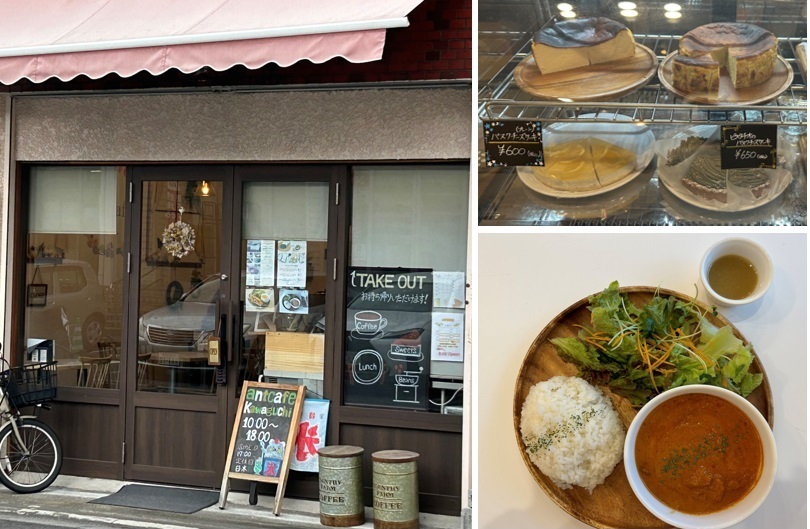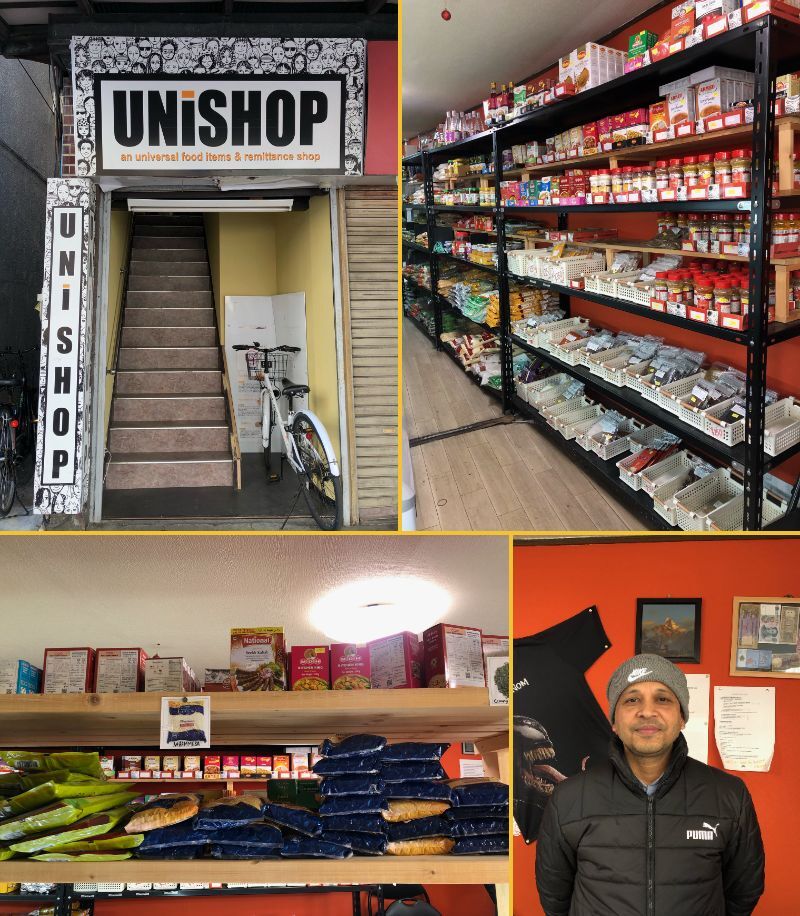People
People
Contents
◆Foreign Care-worker Playing an Active Part in Care-homes ①~Kurnia from Indonesia~
◆Foreign Care-worker Playing an Active Part in Care-homes ②~Ian from Philippines~
◆Take a Breather at a Couple Owned Charming Cafe ~antcafe Kawaguchi
◆Shop Full of Spices and Cosmopolitan Frequenters; “UNiSHOP”
Foreign Care-worker Playing an Active Part in Care-homes ①~Kurnia from Indonesia~
Chances of being welcomed by foreign workers at convenience stores, eating establishments, etc. are increasing around here. In recent years, with few exceptions, care-homes for the elderly are also getting more and more care-workers who have come from abroad.
I am going to report in two parts on foreign care-workers who are playing important part in care-homes in Kawaguchi City.
The first report is on Kurnia, from Indonesia, working at Kawaguchi Senior Center.
【About Kurnia】
Kurnia is from West Java Province. Came to Japan after taking one- year course at a Japanese language school in Indonesia. She worked at a care-home in Nagano Prefecture for the first three years, then moved to start working at a current care-home.
One reason of her choosing to work in Japan was that she wanted to save money, but also thought “I am still young, I ought to have more and more experiences”.
Before coming to Japan, she used to work in a totally different field from nursing care. I am sure it must have taken a lot of courage to start an unexperienced job in a country with unfamiliar language and culture.
【About her job at a care-home】
Her job includes eating, bathing and toileting assistance of residents of care-home. When she works on night duty, she has the hardest time to watch over as many as 20 residents on her own.
Naturally, conversation with residents and other staff are in Japanese. Kanji and the way to use honorifics are hard enough for her, moreover, there are residents who speaks dialect and that always puzzles her so much.
Nevertheless, she says with a smile, “When chatting with elderly residents here, they talk a lot about their olden days. It is fun for me to listen to such stories”.
【Cultural, habitual, religious difference】
The first trouble she encountered in Japan was that she found many buttons to press in a toilet. She could not find out how to use them. (Pressed a button by mistake and got soaking wet with shower function.)
Since she is a Muslim, the only food she can have is religiously permitted Halal Foods. For that reason, she makes and brings her own meal every day.

I also had a talk with her Japanese co-workers, Mr. Wakamatsu and Ms. Takahashi.
【Occupational arrangements and considerations】
They always confirm whether she could understand what she should do each time they talk to her. If the language seems difficult for her, they use photos as supporting material to make her fully understand.
They do recognize that she needs to observe food restriction posed by her religion. But aside from that, they sometimes get surprised to know the difference of eating habits such as she never eats uncooked food.
In addition to these cultural differences, they have the holy Muslim month of Ramadan (※). During this Ramadan period, they provide such special arrangement for her as allowing exemption from bathing support for the elderly, or giving home leave back to her own country, etc.
【Influence on the care-home and co-workers】
At a “Senior Festival” regularly held at the care-home, when staff from abroad feasted residents on their taste of home country, it was well recognized among the residents. They say Kurnia made some Indonesian dessert for the occasion.
Also, foreign workers’ polite way of speaking sometimes reminds Japanese workers of being more careful to use “beautiful language”.
(※)Fast month. Eating and drinking is prohibited from dawn to dusk.
Editor’s NOTE
After interviewed Kurnia and her co-workers, I could feel a friendly atmosphere of this working place.
The problem of shortage of capable workers is not limited in care-giving field. We are needing more and more assist of foreign workers. Know the importance of having communications, also know the importance of understanding the cultural and habitual differences is what we need to recognize now. By Kishida

Foreign Care-worker Playing an Active Part in Care-homes ②~Ian from Philippines~
Continued from the report ①. I am going to introduce you Ian from Philippines, working at Dai-Ni Kawaguchi Senior Center.
【About Ian】
Ian is from Leyte Island, Philippines. After finished his course at university, he worked as a private nurse (contract nurse to provide nursing care at patient’s domicile) for a while. One day, one of his friends informed him of the opportunity to get a job in Japan. That have led him to come to Japan.
First, he worked at a care-home in Okayama Prefecture where he obtained a qualification for Licensed Nursing Care Worker. Then came here to work at the current care-home. Licensed Nursing Care Worker’s examination is carried out in Japanese. It must be difficult for a foreign examinee to pass that examination. Ian, who have successfully passed the exam, must have made extra special efforts for it.
【About his job at a care-home】
Ian, too, complained that the correct use of honorific language and deciphering dialects are the most difficult part. (Funny enough, he says he sometimes unconsciously slips out Okayama dialect)
Generally, keeping care record in Japanese said to be very difficult for foreign care givers. However, he somehow manages it by using PC’s function to translate English text into Japanese. Making the best of ICT, etc. that is the youngsters of today, is not he?
When he was asked about the most fun part of his job, he says it is when talking with residents of care-home, it reminds him of having a family chat. On the other hand, he will get devastated when witnessing a resident’s last breathing.
【Cultural, habitual, religious difference】
As for food, he says he had no problem with it. But taking out garbage is very hard to understand in Japan. When it comes to garbage disposal rules, it always confuses you since rules differ from municipalities. It may not be a difference only between Philippines and Japan.
At first, he was taken aback by the roundabout way of saying Japanese often use, which listeners often need to read between the lines. But now he has completely got used to it.

I also had a talk with his Japanese co-workers, Mr. Honda.
【After starting working with him】
At first, linguistic difference may become a problem. But now we know there is so many things we should learn from ardent foreign care givers. We all appreciate that they have come to join us.
As for Ian, he seems to get well used to this place that sometimes it completely slips their minds that he was from Philippines.
【Influence on the care-home and co-workers】
It depends on individual, but generally, foreign workers tend to have more cheerful personalities and chatty. The facility always gets brighten up by their presence.
Also, seeing foreign care givers working and learning a language in a place far from home, it always gives Japanese workers a feeling of “we also got to do more harder”.
Editor’s NOTE
I could understand how he takes pride in his job as a Licensed Nursing Care Worker. I cannot help but wishing that these wonderful care givers like Kurnia and Ian will become the leading figures indispensable in supporting the nursing-care scenes of Kawaguchi City
Lastly, I am taking this opportunity to express my gratitude to every staff at care-homes I have met. Owing to your cooperation, I could accomplish these reports. Thank you very much.
By Kishida

Take a Breather at a Couple Owned Charming Cafe ~antcafe Kawaguchi~
Cafe & Cake place “antcafe Kawaguchi”, which you will find after walked about 10 minutes from Kawaguchi Station, West Exit. Nearly 2 years have passed since its opening, the place is serving homemade cakes and coffee as its staples, as well as serving lunch meals.
The cafe, run by a couple, is filled with homey atmosphere.
Today’s “Discover! Kawaguchi” introduce you “antcafe Kawaguchi” and its owner couple, Mr. and Mrs. Masuda.
The couple says they moved to Kawaguchi a few years ago.
In due course, they found comfortableness of living in here and hidden magnetism of Kawaguchi, that is, in a word, the diversity that are proved by the residents comprised of various nationalities.
It was Mrs. Masuda’s long-cherished dream to have her own cafe.
To open a cafe that makes everyone feel a delight and lift the weight from heart in the dizzying bustle of everyday life was what she had been dreaming of.
“Kawaguchi is the ideal place to have my own cafe to entertain every customer under the sun!” Encouraged by this inspiration, they decided to open this place.
“We welcome, of course, you even you do not understand Japanese! When we have such non-Japanese speakers, we will communicate in English or “Plain Japanese”! We were indeed grateful to have such a customer the other day”, they told me with brilliant smiles. I could see their passion towards this place that had been shining through this conversation.
As I stepped inside, I found a guitar displayed in front of me. Further interview revealed that Mr. Masuda’s previous occupation was selling guitars.

On the day I visited for interview, I had the Week’s Lunch Special.
“Shrimp Cream Curry Plate (with salad) was what I had for lunch. That was a special curry that had obviously been made by blending spices. Not too hot, but its full-bodied savory made me feel like I was in heaven!
Inside the shop’s showcase, there awaits alluring cakes such as Basque cheese cake, etc. All are baked in the shop, by Mrs. Masuda.
Coffees served here are Siphon (vacuum pot) coffee. Compared to Drip coffee, Siphon coffee produces distinctive rich flavor and aroma. Rich flavor deepened by this brewing method is also good to taste as iced coffee. By the way, it is Mr. Masuda who oversees making coffee and coffee jellies.
Unhampered by nationalities, anyone can take a breather here; at “antcafe Kawaguchi”. It is one of the hidden spots of Kawaguchi City with a touch of multicultural vibes. I insist you must come and enjoy the atmosphere here!
Information on « antcafe Kawaguchi »
Address:32, Haramachi 9-Chome, Kawaguchi, Saitama. 〒332-0025
URL:https://antcafe.wixsite.com/kawaguchi
Phone:050-5236-5065

Shop Full of Spices and Cosmopolitan Frequenters; “UNiSHOP”
Walk 3 minutes from JR Kawaguchi Station East Exit, find the sign “UNiSHOP” and walk up the narrow stairs. And there, an exotic space full of foodstuff, various spices, chickpeas, lentils, spicy hot snacks, etc., that you will never be able to find at any Japanese supermarkets welcomes you.
Today, I interviewed the owner of this “UNiSHOP”, Mr. Choudhury Sujit, and asked him about the story of this shop and himself.
Mr. Choudhury from Kolkata, India. Came to Japan in 2011, and first settled in Tokyo, then moved to Kawaguchi City where lots of people from the same town live and opened this “UNiSHOP”.
The name “Uni” is derived from “universal”. True to its name, the shop is frequented by people from various countries. He says people from India, Nepal, Bangladesh are the largest number as customers, but these days people from Senegal, Ghana are also increasing.
Among countless shops that deal with ethnic foods in Kawaguchi City, this shop distinguishes itself in its multilingual services. He speaks Hindi, Bengali (Bangladesh language), Urdu, Nepali, English as well as Japanese!
Taking advantage of his language skill, Mr. Choudhury also supports foreign residents who cannot understand Japanese when they need to go to municipal offices to go through procedures or need to go to a hospital. Not only dealing with foodstuff foreign residents in Kawaguchi City need, but also reaches out his helping hand for people in need. What an encouraging person he is!
I have tried to make authentic Indian curry with spices I bought at “UNiSHOP”. I have attached a video and recipe with this report. I really recommend you to give it a try!

2-types of authentic Indian curry recipe (serves 6)
【Ingredients】
Spice A (1 Cinnamon stick, 6 Cardamoms, 6 Cloves 1-teaspoon of Cumin seeds)
Spice B (1-tablespoon of Coriander, 2-teaspoons of Turmeric, 1-tablespoon of Cumin powder, 1-teaspoon of Chili powder), 2 Onions, 150 g. of Canned chopped Tomatoes, 400 g. of Chicken thigh, 100 g. of Moong lentil, 100 ml. of Yogurt, 1-teaspoon of Salt, Garlic, Ginger, Water.
【How to cook】
① Soak moong lentils in water (for 2-3 hours). Sprinkle salt and pepper on chicken thigh.
② Stir-fry Spice A with oil (in order of cinnamon/cloves, cardamoms → cumin seeds)
③ Add finely chopped onions and a pinch of salt into ②, keep stir-frying until the color turns brown.
④ Add grated garlic and ginger. Keep stir-frying.
⑤ Add Spice B, blend well.
⑥ Divide the contents of ⑤ into two pots (Pot A・Pot B)
⑦ Add chopped tomatoes and chicken thigh to Pot A, stir-fry it, add yogurt, water. Simmer it for about 20 minutes.
⑧ Add water and moong lentils to Pot B. Simmer it for about 30 minutes (till lentils got soft).
Editor’s Note
As well as serving as communities for foreign residents in each area, ethnic food stores and restaurants are also playing a role of connector that enables Japanese to know more about foreign cultures. We might be prone to pass by “UNiSHOP, but once you get inside the shop, I am sure you will be blessed with new discoveries and encounters. Why do not you pluck up the courage to come in?
For your information, Mr. Choudhury is running an Indian curry restaurant in Kawaguchi city. If you have got an interest in it, start searching “spicestory 川口” now! By Kishida

